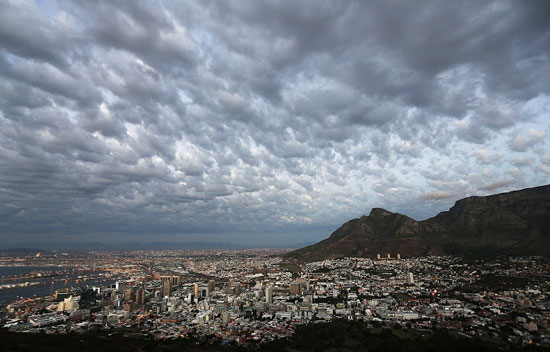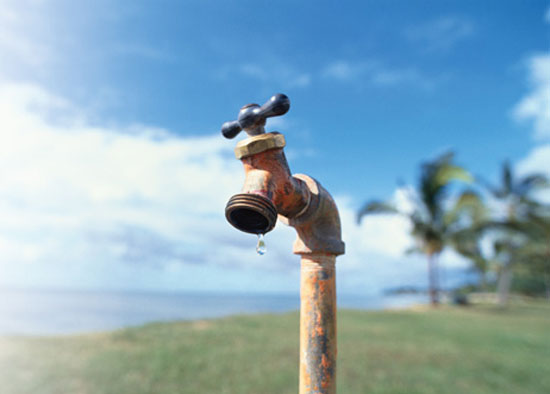Cape Town residents dread ‘disaster’ as city waits for water to run out

It’s known as the “Cape of Storms” for the dreaded weather systems that roll in from the Atlantic Ocean, tormenting sailors, flooding fields, and sending torrents of water gushing down the slopes of the city’s famous mountains.
But those conditions have not been seen for a long time, and last year Capetonians endured the worst drought in their history. They were praying the heavens will open, so their taps will not be switched off. They are calling that moment “Day Zero” (when the city will have to ration water drastically). This year (2019), yet another severe drought is announced for their region.
In 2018, Cape Town recorded its driest year since 1933, and the three years to the end of 2017 were also the driest period in those 84 years. While water restrictions have been in place since May 2017, the city’s water supply is expected to completely run out…
Survival strategies
Speak to anyone from Cape Town and you will find they suddenly know an awful lot about how to save water.
“When we get together with friends it’s all we talk about,” says Louise Mullholand.
Her family are using their braai (barbecue) more often so they don’t need to wash pots and pans. They’re also collecting fresh water from a nearby spring to supplement their supply – “the queues are a nightmare and there is a security guard to make sure people only collect their allowance”, she says.
Most keen water-savers take two-minute showers over buckets, reusing the water to flush their toilets.
Others avoid washing altogether. Elizabeth Bishop is getting her kids to eat their meals naked.
“Playground dirt and dust, the clothes just get re-worn, but food marks are pretty gross so we just avoid that,” she says.
In an online thread, Despina Learmoth recommended spraying dirty clothes with a solution of water and vinegar before hanging them to air – then going out to buy loads of knickers. “Or just stop wearing any at all!” she says.
Laurian Sachs has disconnected her washing machine from the plumbing and reuses the water in subsequent loads. Once it’s too dirty, she uses it to flush the toilets.
“I won’t be able to flush good drinking water away with my poo into the sewer ever again”, she says.
Divisions emerge
As tends to happen in times of crisis, Cape Town’s water shortage is both bringing the community together and threatening to split it apart.
“It will affect everyone very differently depending on their disposable income”, says Terri Kallis.
Her family have a well point, while other affluent households are installing boreholes at a cost of tens of thousands of rands.
Ms. Kallis sees a cross section of people in her physiotherapy practice and says many of her more affluent patients who have tapped into ground water are not too concerned about how much they use, but her older patients are worried how they will cope when they reach Day Zero.
Once the taps are turned off, residents will be allowed to collect 25 litres per person per day from 180 sites across the city.
Police and defence forces will help secure the sites, but many questions remain about how they will operate.
How will families collect water for multiple people? How will people carry the water away from the collection point?
And most importantly, with a population approaching 4 million, is one collection point per 20,000 people nearly enough?
“It will be an unmitigated fiasco,” says Sandra Lallemand.
She says her family lives in a tight-knit community that already look out for each other, but admits that they are privileged, and that kindness can be a luxury.
Already it’s a quality many are not showing.
Blame and finger pointing
Neighbours have been shaming each other online, posting photos of excessive water use to social media.
Residents have also been lashing out at each other as a result of a controversial online database launched by the local government allowing people to monitor each other’s usage based on water bills.
As the crisis deepens, various groups have turned on each other: private users pointing fingers at businesses, locals getting angry with tourists, the rich few blaming the poor masses, people living in informal housing calling out residents in affluent areas.
Years after apartheid, there is still a stark division between the various Cape Towns.
Cape Town’s sprawling “townships” are dominated by informal and public housing; videos have circulated of township residents washing cars and taxis, inciting bitter comments from suburban residents.
In response, statistics are cited that show people in informal housing account for single digit water usage, while formal residents use 65 per cent of the city’s water – numbers often followed by mutterings about suburban residents’ rolling lawns, lush gardens and swimming pools.
For many, every day is Day Zero

For many living in the townships’ informal housing without plumbing, it’s been Day Zero their whole lives.
Lukalo Mdulu moved to Cape Town from the Eastern Cape to find work and is now a gardener for Terri Kallis and others living in Cape Town’s suburbs.
He lives in informal housing in the township of Khayelitsha, and has never had a shower, never mind a two-minute one.
Every day, before and after work, he collects 25 litres of water from a nearby tap for his wife and three kids.
They bathe daily from a bucket, so water restrictions do not change things much at home, but they could affect his gardening work.
“If everything is dry, people will say there is no work. I am very worried,” Mr. Mdulu says. He is the only wage earner in his family of five.
Ms. Mpaliso reckons nearly 2,000 people depend on the tap where she gets her water.
She prefers to collect one load using a 20-litre bucket than to go back and forth with a five-litre bucket.
“I have no choice. If I use a five-litre bucket I know I’ll have to go back and then there will be a queue,” she says.
“I was thinking that from today, I’ll start buying bottles to keep water for myself.”
The future is unclear
The city has said when Day Zero arrives, it will not disconnect the water supply to the townships, but these are vast, varied places that house more than a million people, and it is not clear how everyone will be affected.
While some people live in informal shacks, with shared taps and no toilets, others live in government-built units, with plumbing.
Nomawonga Khohliso, a social worker with a local NGO, shares a flat with four adults and three children and is already doing all she can to cut down their water usage.
She has been washing her dishes with bleach so the recycled water doesn’t smell and she bathes all her kids together, which presents difficulties when her older daughter has her period.
But it could get worse.
If her family of seven must collect their water every day, they will lose valuable hours they could otherwise be spending at work or school.
A drought of leadership
The catastrophe Cape Town is facing is at once a simple problem and a very complex one, but whichever way you look at it, leadership has been as wanting as water.
Seen simply – for the past few years the water coming in has been significantly less than the water going out, and as anyone who manages a budget knows, that always ends poorly.
Cape Town is a beautiful city, with a thriving tourism industry and a booming property market, all of which have attracted many to its shores, slopes and townships.
But despite numerous warnings from experts, the city’s water supply has not kept pace. As the crisis has drawn closer, there’s been much finger pointing and feet dragging among the bodies tasked with keeping the city’s taps on.
Now with impending disaster has come real action.
The city received a donation of an extra 67 million litres of water per day for a short period from a nearby catchment area.
And a citywide effort has meant tens of thousands of residents came closer to hitting 50 litres of water per person per day before it became the recommended level on February 1, 2018.
It may still be too little, too late, but one thing is for sure: today’s Capetonians will never again treat their Mother City, as they call it, as a place of endless abundance.
yogaesoteric
February 12, 2019
